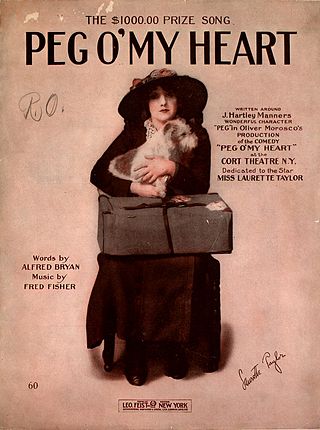
"Peg o' My Heart" is a popular song written by Alfred Bryan (words) and Fred Fisher (music). It was published on March 15, 1913 and it featured in the 1913 musical Ziegfeld Follies.

A novelty song is a type of song built upon some form of novel concept, such as a gimmick, a piece of humor, or a sample of popular culture. Novelty songs partially overlap with comedy songs, which are more explicitly based on humor, and with musical parody, especially when the novel gimmick is another popular song. Novelty songs achieved great popularity during the 1920s and 1930s. They had a resurgence of interest in the 1950s and 1960s. The term arose in Tin Pan Alley to describe one of the major divisions of popular music; the other two divisions were ballads and dance music. Humorous songs, or those containing humorous elements, are not necessarily novelty songs.
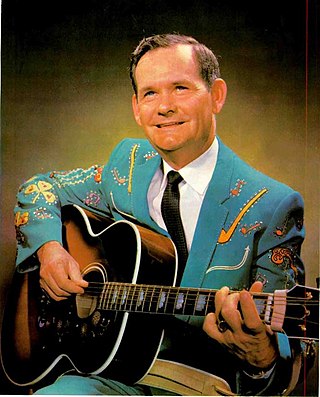
Lawrence Hankins Locklin was an American country music singer-songwriter. He had 70 chart singles, including two number one hits on Billboard's country chart. His biggest hits included "Send Me the Pillow You Dream On" and his signature "Please Help Me, I'm Falling". The latter also went to number eight on the Billboard Hot 100 pop music chart. Billboard's 100th anniversary issue listed it as the second most successful country single of the rock and roll era. It sold over one million copies, and was awarded a gold disc by the RIAA.

"Who's Sorry Now?" is a popular song with music written by Ted Snyder and lyrics by Bert Kalmar and Harry Ruby. It was published in 1923 as a waltz. Isham Jones had a hit recording in 1923 with the song arranged as a foxtrot. Later sheet music arrangements, such as the 1946 publication that was a tie-in to the film A Night in Casablanca, were published in 2
2 time. Other popular versions in 1923 were by Marion Harris, Original Memphis Five, Lewis James, and Irving Kaufman.
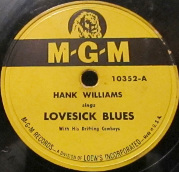
"Lovesick Blues" is a Tin Pan Alley song, composed by Cliff Friend, with lyrics by Irving Mills. It first appeared in the 1922 musical "Oh, Ernest", and was recorded that year by Elsie Clark and Jack Shea. Emmett Miller recorded it in 1925 and 1928, followed by country music singer Rex Griffin in 1939. The recordings by Griffin and Miller inspired Hank Williams to perform the song during his first appearances on the Louisiana Hayride radio show in 1948. Receiving an enthusiastic reception from the audience, Williams decided to record his own version despite initial push back from his producer Fred Rose and his band.

Lloyd Estel Copas, known by his stage name Cowboy Copas, was an American country music singer. He was popular from the 1940s until his death in the 1963 plane crash that also killed country stars Patsy Cline and Hawkshaw Hawkins. Copas was a member of the Grand Ole Opry.
"Please Help Me, I'm Falling" is a 1960 song written by Don Robertson and Hal Blair and first recorded by Hank Locklin. The single was Locklin's most successful recording and was his second number one on the country charts. "Please Help Me, I'm Falling" spent 14 weeks at the top spot and spent nine months on the country chart and crossed over to the Hot 100 peaking at number eight.
"Lonesome 7-7203" is a 1963 single by Hawkshaw Hawkins, written by Justin Tubb. It was the final single release of his career, released in 1963 on the King label.
"Rainbow at Midnight" is a song written by Lost John Miller. The song originally made the Juke Box Folk chart when it was recorded by The Carlisle Brothers in 1946. "Rainbow at Midnight reached number five on the Juke Box Folk chart.
John Marcus Lathrop was an American vocalist and guitarist with the Tune Twisters, Glenn Miller, and Hal McIntyre. Beginning around 1947, Lathrop was leader of the Drug Store Cowboys.
"Signed Sealed and Delivered" is a song by Cowboy Copas. Copas recorded a hit version for King Records, which reached number two on the Most Played Juke Box Folk Records chart in 1948. Copas re-recorded the song in 1961 for Starday Records, in Stereophonic Sound, and with a more modern style. This version also charted, reaching number 10 on the Hot C&W Sides chart.

"Goodbye, Little Darlin', Goodbye" is a 1939 song written by Gene Autry and Johnny Marvin. Autry sang it in the December 1939 movie South of the Border, and released it as a single in April 1940. It went on to make both Popular and Hillbilly (Country) listings for 1940.
The discography of American country singer-songwriter Hank Locklin contains 29 studio albums, 10 compilation albums, two box sets, 96 singles, two additionally-charting songs and one album appearance. He had his first hit with "The Same Sweet Girl" (1949) after signing with Four Star Records. The song reached the top ten of the Billboard country singles chart, peaking at number eight. A string of singles were released over the next several years that were not successful. With a leasing agreement administered by Decca Records, he had his next hit in 1953 with the number one song, "Let Me Be the One." Disappointed by label management, he switched to RCA Victor Records in 1955. Under the production of Chet Atkins, he had his biggest success. His next hit came with 1956's "Why Baby Why," which reached number nine on the country chart. Between 1957 and 1958, he had three top-ten country hits: "Send Me the Pillow You Dream On," "Geisha Girl" and "It's a Little More Like Heaven." In 1958, he recorded country music's first concept albums, Foreign Love. In 1960, Locklin released his biggest hit single, "Please Help Me, I'm Falling." Not only did it top the Billboard country singles chart, but it also reached number eight on the Billboard Hot 100 list. It was also one of several hits Locklin had in the United Kingdom, peaking at number nine on their pop chart.

"Drivin' Nails in My Coffin" is a country music song written by Jerry Irby. It is a breakup song, telling of a man who has been drinking booze, "driving nails in my coffin over you."

Foreign Love is a studio album by American country singer-songwriter Hank Locklin. It was released in January 1958 via RCA Victor Records and was produced by Chet Atkins. It was the Locklin's debut studio album in his recording career. It was also a concept album that focused around the theme of love overseas. The album would be one of many Locklin concept records issued by RCA Victor until 1972. Foreign Love featured his major hit from 1957, "Geisha Girl." It was received favorably by critics in years following its release.

Happy Journey is a studio album by American country singer–songwriter Hank Locklin. It was released in January 1962 via RCA Victor Records and was produced by Chet Atkins. Happy Journey was Locklin's third studio album released in his recording career. It contained a total of 12 tracks, three of which were hits on the country chart: "You're the Reason," "Happy Birthday to Me" and the title track. It included a combination of new recordings and cover versions of songs previously recorded by other artists.

This Song Is Just for You is a studio album by American country singer–songwriter Hank Locklin. It was released in May 1963 via RCA Camden records. The project was co-produced by Chet Atkins and Steve Sholes. This Song Is Just for You was Locklin's sixth studio album release and included songs recorded over the span of several years. It was also his second album to be released on the RCA Camden subsidiary label. The record featured four original singles, including the hits "One Step Ahead of My Past" and "Why Baby Why."

"The Same Sweet Girl" is a song written and originally recorded by American country singer–songwriter, Hank Locklin. It was released as a single via Four Star Records in 1949. The song became Locklin's first major hit as a recording artist, reaching the top ten of the Billboard country chart. Since its release, it has been reissued several times on compilation records.
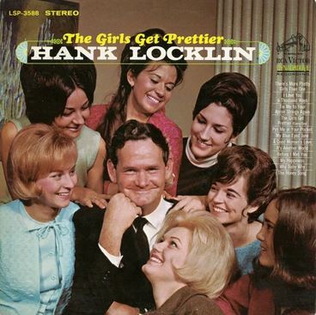
The Girls Get Prettier is a studio album by American country singer–songwriter Hank Locklin. It was released in May 1966 via RCA Victor Records and was produced by Chet Atkins. It was Locklin's thirteenth studio recording in his music career and contained two singles, one of which became a top forty hit in 1966. The album consisted of 12 tracks and received mixed reviews from music publications.
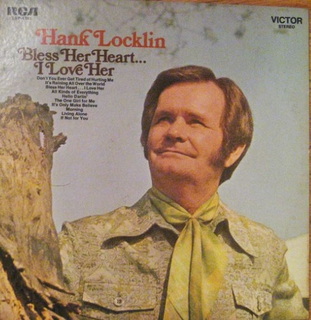
Bless Her Heart...I Love Her is a studio album by American country music singer–songwriter Hank Locklin. It was released in August 1970 and was produced by Danny Davis. It was Locklin's twenty second studio release in his music career and contained a total of ten tracks.















